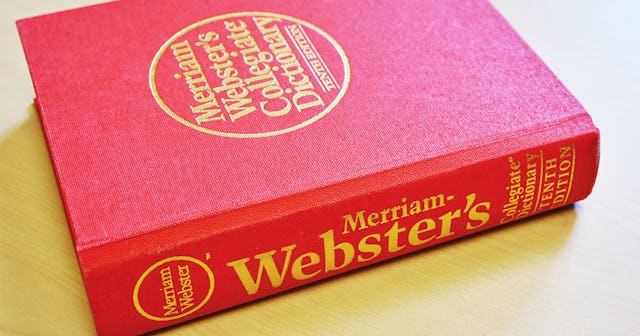'Dad Bod' Is One Of The 455 New Words Added To The Dictionary This Year

A bunch of new words were added to the dictionary, including a few head-scratchers
“Just as the language never stops evolving, the dictionary never stops expanding,” Merriam-Webster said of its decision to add 455 new words to the “living language” we all use. Some are a result of the pandemic, others tech-related, and some are just because we can’t be bothered to say, or type, full sentences anymore.
Of the hundreds of words added, some of our favorites are “dad bod,” which refers to the state a body achieves after becoming a father, “especially : one that is slightly overweight and not extremely muscular,” “TBH,” which is a shortened version of “to be honest,” and “fluffernutter,” because, well, it’s just fun to say and eat.
The dictionary pulled words from pop culture, medicine, the coronavirus, politics, and food, among other categories to create a word salad of epic proportion. Two rather cringe-worthy additions for those who love language are “amirite,” which is slang for “am I right,” and “because.” Obviously, “because” as a word was already included in the dictionary, but now it’s given another meaning to avoid “delving into the overly technical (‘the process works because science’) or to dismiss explanation altogether (‘they left because reasons’). Sigh.
Others make sense living in the world of a global pandemic like “super-spreader,” “long COVID,” and “vaccine passport,” which we will be living with for years to come. Of course, you can’t ignore the political climate when it comes to new words, which is why words like “whataboutism,” which refers to the “act or practice of responding to an accusation of wrongdoing by claiming that an offense committed by another is similar or worse,” have also been included.
Naturally, every update has to include new food items we’ve created as a society, which have either bettered us as people (hello fluffernutter) or ones that, because of said pandemic, we’ve all become accustomed to like, “air fryer.”
The last time Merriam-Webster added new words was in January of this year with a whooping 520 additions including “flex,” “cancel culture,” and “silver fox.” But how do they decide which words get in?
“Each day most Merriam-Webster editors devote an hour or two to reading a cross section of published material, including books, newspapers, magazines, and electronic publications; in our office this activity is called “reading and marking,” they said on their website. “The editors scour the texts in search of new words, new usages of existing words, variant spellings, and inflected forms–in short, anything that might help in deciding if a word belongs in the dictionary.”
Seems legit, TBH. Amirite?